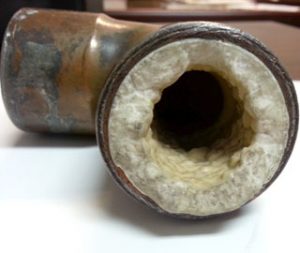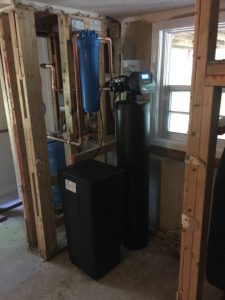WATER FILTRATION OPTIONS IN MASSACHUSETTS

Because of the geological makeup of the earth’s crust in Massachusetts, there are certain minerals that dissolve into the snow and rain as it filters through the ground and soaks through the soil. The amount of these minerals in the water supply varies depending on where your source water is located. Different regions of the United States have their own unique water quality issues due to different bedrock and minerals that dissolve into the water supply. For example, in the Midwest, the bedrock is comprised of high levels of calcium and magnesium. These are water hardness minerals that a large number of homeowners have to deal with, typically with water softeners. In Massachusetts, the most common minerals and other contaminants that confront homeowners, particularly those with private wells are:
Iron
Manganese,
Low pH,
Radon and
Arsenic
Hardness
(Note: To determine appropriate testing, speak to a state certified laboratory or a water treatment professional):
While these are not the only contaminants that are detected in Massachusetts wells, these are the ones that most often show up in water test results above the level at which action should be taken, particularly in Eastern Massachusetts. In some cases these represent health threats and in others they can be aesthetic related to the staining of fixtures and other surfaces. Additionally, potential physical damage issues such as corrosion of pipes or damage to water using appliances in the home are to be considered. A water filtration system or water softener can often be the solution or part of the solution to correcting these problems, which will be discussed further below.
Dissolved Iron Build-Up in Tub
While a large number of homes in Massachusetts are supplied by the Massachusetts Water Resources Authority (MWRA), the focus of the balance of this paper is to review common problems and water filtration systems or water softeners as solutions to the most common water quality issues faced by private well owners. For more information on MWRA water quality questions and issues, see the website at the following link MWRA Water Quality Questions
Water testing

Water testing should be conducted by an EPA or Massachusetts state certified laboratory and should include analysis for the parameters in the table below. If you are uncertain as to how to take a proper sample and get it to a lab, you should contact a lab or water treatment professional for assistance. They can walk you through the steps required to complete this task. Typical items tested for are as follows:
Coliform bacteria, pH
Arsenic, Radon
Chloride, Sodium
Iron, Manganese
Sulfate, Lead, Hardness
Conductivity, Nitrogen-Nitrate
Your town’s Board of Health may also specify certain other items to be tested for based on local knowledge. In addition to the above requirements, some town Boards of Health require testing for Volatile Organic Compounds including Methyl Tertiary Butyl Ether (MTBE). This substance used to be used as a fuel additive in gasoline to reduce airborne emissions. Unfortunately, in some cases, it seeped into the ground from fuel tank leaks and may reach certain wells. This has happened all around the country, however testing and remediation has proven effective. If the testing results for Radon exceed the current Massachusetts guideline of 10,000 pCi/L (Pico curries per liter) in water, the radon must be removed from the water and most Boards of Health recommend testing the air for Radon as well. It should be noted that New Hampshire requires action if radon is 2,000 pCi/L (Pico curries per liter), Maine and Rhode Island are at 4,000 pCi/L. The EPA has more information on water testing at EPA Water Quality Testing
IRON & MANGANESE
Iron and Manganese are naturally occurring minerals commonly found in New England’s water supply. Together, they are commonly referred to as “The Stainers” in the water treatment industry.
Iron shows up in two forms; Dissolved in solution (ferrous form – can’t see or in solution) or precipitated (ferric) particulate iron which you can see in the water. Typical symptoms of iron in your water include Red/Brown stains in sinks, tub, dishwasher, laundry and/or Metallic taste. Iron may also show up in the form of Iron bacteria. Although harmless, iron bacterial can form gelatinous growths that my plug pipes or break free in slugs of dirty iron-laden water with unpleasant tastes and odors. The U.S. EPA drinking water regulations set a recommended secondary maximum contaminant level of iron .3 milligrams per liter for iron in water. The reason they call it a secondary is that iron isn’t considered a primary health threat. See the link at Water Tech Article about Iron in Water/ for more information on Iron in water and related water filtration challenges.
SOLUTION: Manganese and Iron can be removed with sediment filtration and water softening (Ion Exchange) technology. Particulate manganese and iron will be removed with the proper sediment filtration while dissolved iron and manganese can be removed with a water softener. For more information on manganese, see the link at the Water Technology Magazine article at: http://www.watertechonline.com/manganese-the-good-for-you-bad-for-you-mineral/
Water Filtration Systems
Water filtration systems can be installed for the removal of any of the contaminants listed in the above table. Water softeners are typically installed to remove iron or manganese in the water through a technology called Ion Exchange. Arsenic is removed with tanks containing a specific media that “grabs” the arsenic out of the water. Removing radon from water requires a system where the water is agitated in a sealed compartment to release the gas, but then vented the radon gas outside the home to ambient air. Other technologies and systems are used to remove the other contaminants. Any water filtration system or water softener selection should start with a water test before an informed recommendation can be made.
SUMMARY
While Massachusetts has its own unique water quality issues, there are various types of water filtration or water softening solutions to address them with confidence. An initial water test of a private well should not prevent you from buying a home that you really like. Once you get the information you need to determine what is required to get you safe, good quality water, then you can make a more informed choice.
H2O Care is a regional water filtration and testing firm, formed in 1989. Articles published by the Company can be seen in Water Technology Magazine or linked through the website publications section at www.h2ocare.com


